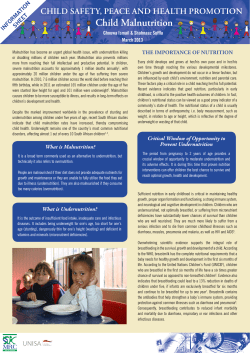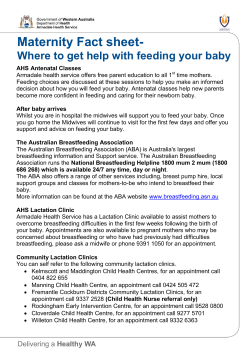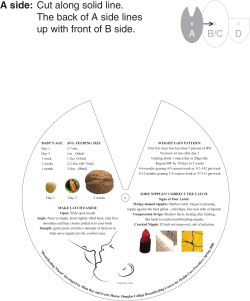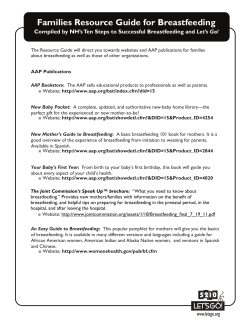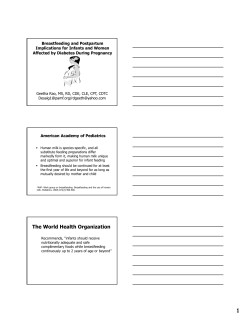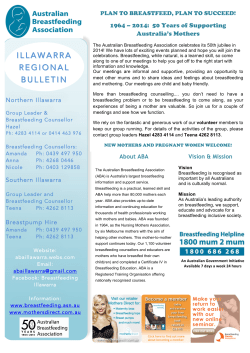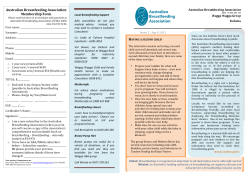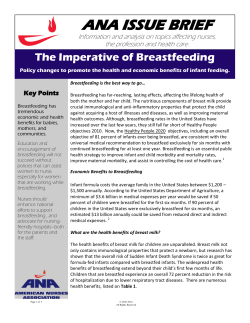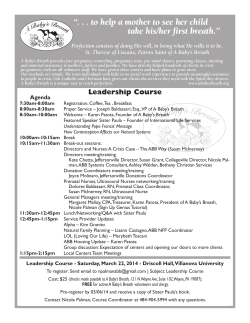
Quick Reference and Fact Sheets March of Dimes Professionals and Researchers
Quick Reference and Fact Sheets March of Dimes Professionals and Researchers Breastfeeding Breastmilk is the best food for most babies. Breastmilk contains all the nutrients a baby needs for healthy growth and development during the first six months of life, as well as substances that help protect a baby from many illnesses. Breastfeeding provides health benefits for the mother, including that breastfed babies are less likely than formulafed babies to have ear infections, lower respiratory infections (such as pneumonia and bronchiolitis), meningitis, urinary tract infections and diarrhea1. Studies also suggest that breastfed babies may be less likely to die from sudden infant death syndrome (SIDS)1. Breastmilk is easy for a baby to digest, so the baby may have less gas and discomfort than a formula-fed baby. earlier return to her pre-pregnancy weight. And The health benefits of breastfeeding can last a there are emotional benefits for mother and baby lifetime. Studies suggest that children and adults from the special bond that develops between them. who were breastfed are less likely to develop The March of Dimes urges all new mothers to asthma, insulin-dependent diabetes and certain breastfeed if they are able. The American Academy cancers (leukemia, lymphoma and Hodgkin’s of Pediatrics (AAP) recommends that a baby be disease)1. Babies who were breastfed may be breastfed for at least twelve months1. However, even less likely to become obese later in life1. babies who breastfeed for only a short period of time experience health benefits. What are the benefits of breastfeeding for the baby? Breastfeeding also may enhance brain development. Some studies suggest that children who were breastfed may score higher on tests of cognitive ability than children who were fed formula1. Breastmilk provides the ideal amounts of protein, sugar, fat and most vitamins a baby needs for healthy growth and development. Breastmilk also contains substances called antibodies that help protect a baby from many illnesses. Studies show 920 West Street Building B • Peru Phone: (815) 223-2944 What are the benefits of breastfeeding for the mother? Breastfeeding leads to increased levels of a hormone called oxytocin that causes the new mother’s uterus to contract. This contraction helps Quick Reference and Fact Sheets reduce bleeding after delivery and shrink the uterus Breastmilk includes antibodies and other immune- to its pre-pregnancy size. Breastfeeding also delays system substances that help protect a baby from the return of a woman’s menstrual period, helping illness. It contains growth factors, hormones and her to postpone another pregnancy. It is difficult to other substances that help a baby grow and develop determine when fertility will return in a breastfeeding at an appropriate rate. Breastmilk also contains fatty mother. So if a woman and her partner do not want acids that appear to promote brain development and another baby right away, they should use birth possibly increase intelligence. Some formula makers control when they start having sex again. add two of these fatty acids – DHA (docosahexaenoic Breastfeeding mothers burn more calories than women who don’t breastfeed, so they tend to return to their pre-pregnancy weight more quickly. This is acid) and ARA (arachidonic acid) to their products. However, the long-term benefits of formula enhanced with these fatty acids are not known. true even though a breastfeeding woman should eat The AAP recommends that all babies, including 500 extra calories a day to keep up her milk supply those who are exclusively breastfed, consume at and meet her own nutritional needs2. Studies suggest least 200 international units (IU) of vitamin D to help that breastfeeding may help reduce a woman’s risk of prevent a bone-weakening disease called rickets1. breast and ovarian cancer1,2. Exclusively breastfed babies are at increased risk of How do breastmilk and formula differ? Breastmilk contains all the ingredients that a human baby needs to thrive. Formulas based on cow’s milk or soy include many of the same nutrients, rickets because breastmilk is low in vitamin D. Most formula-fed babies get enough vitamin D. Breastfed babies should receive multivitamin drops containing vitamin D starting in the first two months of life1. but not all. Formula makers cannot duplicate all of Unlike formula, breastmilk changes as a baby the ingredients in breastmilk, because some of the develops and provides just the right amount of ingredients are not known. nutrients and other substances that a baby needs at various stages of development. For example, for the first few days after delivery, a woman’s 920 West Street Building B • Peru Phone: (815) 223-2944 Quick Reference and Fact Sheets breasts produce a think, yellowish form of milk exceptions. Women in the United States who have called colostrum. Colostrum is high in proteins and HIV (human immunodeficiency virus, the virus that immune substances that the baby needs in the causes AIDS) should not breastfeed because they early days of life. After this time, the mother begins can pass the virus on to their babies in their to produce greater quantities of a thinner form breastmilk1,2. of milk that is lower in protein and higher in fat. The breastmilk of a mother of a premature baby is different from that of a mother of a full-term baby and is designed to meet her baby’s needs at his/her specific stage of development. This recommendation may differ in some developing countries. Women who have active tuberculosis and who have not been treated with medications should not breastfeed. A woman with an illness, such as the flu, usually does not need to How long should a woman breastfeed her baby? interrupt breastfeeding because she will pass along The AAP recommends that infants be fed only antibodies to her baby that will help protect him/her breastmilk (no water, formula, other liquids or solids) from the illness. for about the first six months of life1. Women should continue to breastfeed their babies for the next six months while solid foods are introduced. They can continue breastfeeding after 12 months as long as the mother and baby desire. However, a new mother should keep in mind that breastfeeding for even a short period of time provides health benefits for her baby. Women who have had breast surgery, such as breast enlargement or reduction, should discuss breastfeeding with their healthcare providers. Most will be able to breastfeed, though some may have problems, such as not being able to produce enough milk. Most women who take medications for chronic health conditions (such as high blood pressure or Who should not breastfeed their baby? asthma) or antibiotics for common illnesses (such Breastfeeding is recommended for the vast majority as strep throat) can safely breastfeed. While small of mothers and babies. However, there are a few amounts of many medications do enter breastmilk, 920 West Street Building B • Peru Phone: (815) 223-2944 Quick Reference and Fact Sheets most do not harm the baby. However, a woman Women who are vegetarians can breastfeed their should always check with her healthcare provider babies, but they should discuss their diets with and her baby’s provider before taking a medication their healthcare provider. According to the Centers (including over-the-counter and herbal preparations) of Disease Control and Prevention (CDC), some to see if it is safe to take while breastfeeding. The vegetarians may need to take a vitamin supplement healthcare provider may switch a woman to a safer containing vitamin B123. Without supplementation, medication. Or the provider may advise her to take breastfed babies of women who eat no animal her medication soon after breastfeeding, so most of products may not get enough vitamin B12, which the medication will be out of her system before the may cause brain abnormalities. next feeding. Women whose babies have galactosemia, an A small number of medications are believed to uncommon genetic disorder of body chemistry, pose a risk to a breastfeeding baby. A woman who should not breastfeed1. Babies with galactosemia takes these medications will probably need to stop cannot process the sugar in milk (including breastmilk breastfeeding temporarily and formula-feed her and dairy-based formulas) and may die or develop baby as long as she takes the medication. These mental retardation if they eat any milk products. drugs include cancer drugs, radioactive compounds Babies with galactosemia must be fed a non-dairy (used with certain imaging tests) and some drugs formula. Newborn screening tests detect most used to treat migraine headaches1,2. Illicit drugs, such babies with galactosemia soon after birth. as cocaine and amphetamines, also pose a risk to breastfeeding babies, as do large amounts of Do premature or sick babies benefit from breastfeeding? alcohol1. Women should avoid these substances Many premature or sick babies cannot feed from while breastfeeding. the breast right away. However, the benefits of breastmilk, including protection from many diseases, may be especially crucial for these babies. 920 West Street Building B • Peru Phone: (815) 223-2944 Quick Reference and Fact Sheets Mothers can use the breast pump to express their lactation consultant. Very few women cannot produce milk so that the milk can be fed to their babies enough milk for their babies, so breastfeeding moms through a tube or with a dropper. By pumping her should ask for assistance when they need it. breasts, a mother keeps up her milk supply so that her baby can breastfeed when she is stronger. All breastfed babies should be checked by a healthcare provider at three to five days of age1. How many women breastfeed their babies? The provider will examine the baby and check to In 2003, about 70 percent of women in the United see if he/she has jaundice (yellowing of the skin, States were breastfeeding their babies when they which occasionally requires treatment). The provider left the hospital4. About 36 percent of women were also will weigh the baby to make sure he is gaining still breastfeeding their babies at six months of age4. enough weight. These are the highest numbers ever recorded in the United States. Where can a woman find information and assistance with breastfeeding? The following organizations can also provide materials and assistance: American Academy of Pediatrics (847) 434-4000 La Leche League, International (800) 525-3243 Pregnant women and their partners should consider International Lactation Consultant Association taking a breastfeeding class. Many hospitals offer (919) 861-5577 these classes. After delivery, the postpartum nurse American College of Nurse-Midwives and the baby’s healthcare provider will help assure Online Community of Mothers and Nursing Professionals that breastfeeding is going smoothly before the woman leaves the hospital. Breastfeeding should not hurt when done correctly. Many hospitals also have a lactation consultant on staff to provide assistance. Once home, a mother should discuss breastfeeding questions with her baby’s health careprovider or a 920 West Street Building B • Peru Phone: (815) 223-2944 References 1. American Academy of Pediatrics (AAP). “Breastfeeding and the Use of Human Milk: Policy Statement”. Pediatrics, volume 115, number 2, February 2005, pages 496-506. Quick Reference and Fact Sheets 2. American College of Obstetricians and Gynecologists (ACOG). “Your Pregnancy and Birth,” 4th Edition. ACOG, Washing, DC, 2005. 3. Centers for Disease Control and Prevention (CDC). “Neurologic Impairment in Children Associated with Maternal Dietary Deficiency of Cobalamin” – Georgia, 2001. Morbidity and Mortality Weekly Report, volume 52, number 4, January 31, 2003, pages 61-64. 4. Centers for Disease Control and Prevention (CDC). “Breastfeeding Practices: Results from the 2003 National Immunization Survey.” Update 8/11/04. Additional Reference Meek, J.Y. (editor-in-chief). American Academy of Pediatrics New Mother’s Guide to Breastfeeding. New York: Bantam Books, 2002. August 2005. Copyright 2008 March of Dimes Foundation. All rights reserved. The March of Dimes is a not-for-profit organization recognized as tax-exempt under Internal Revenue Code section 501(c)(3). Our mission is to improve the health of babies by preventing birth defects, premature birth, and infant mortality. 920 West Street Building B • Peru Phone: (815) 223-2944
© Copyright 2025
